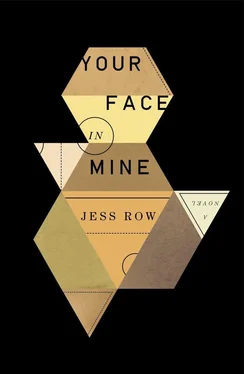I don’t believe it, I said.
Then forget it, he said. Forget I said anything. Don’t matter now, do it? Still dead. Still fucked it up for the rest of us. Got to go down to Jonah House now, stand in line.
I’ll give you a ride, I said. It felt, obscurely, like being at the end of a TV movie; I was supposed to have learned something. I was supposed to be changed. Black people’s lives, I should have said, facing the camera, are no more expressive of statistics than anyone else’s. Who am I, who are you , to go looking in this horror for a pattern?
Naw, Dawson said. Can’t leave the cart.
Put it in the trunk.
Everything’s going to turn out all right, he said, pushing away from me. Trust in the Lord. You hear me?
—
When I went to college I snapped out of my love of hip-hop, as if out of a dream. Someone looked at my tape collection and laughed. Who are you supposed to be, homeboy? I dumped them all in a box and began buying CDs instead — Pavement, The Spinanes, Stereolab, Liz Phair. I grew a goatee, developed a taste for expensive coffee, read Baudrillard and John Ashbery, read Ginsberg and Williams and Pound, read Rexroth and Kerouac and D. T. Suzuki, and began getting up at seven-thirty for daily Chinese classes.
Was I fleeing from something? Was I certain why I loved this new language, with its four tones and eighty thousand characters, its unshakable alienness, its irreconcilability with any language, any world, I knew? Is that even a question? Did any of us know why, given all our advantages, our entitlements, our good study habits and chemically inflated self-esteem, we were still so prone to spastic fits of despair, why we sought out more and more exotic ways of getting high, why we wore Sanskrit rings and tribal tattoos, salon-styled dreadlocks and Japanese see-through raincoats? How could it be running away, when it was nothing more than running in place? How could it be guilt, when the air was so thick with good intentions, with accusations and counteraccusations?
All I know is this: when I came home, I never went downtown. I tore my Illmatic poster off my bedroom wall and used the back for calligraphy practice. In a fit of orderly pique, I carted off the contents of my high school bookcase— Invisible Man, Native Son, The Fire Next Time, The Autobiography of Malcolm X, Soul Brother, Black Like Me, Black Ice, I Know Why the Caged Bird Sings— to the Salvation Army. I waited, listening, for the thunderclap, the world splitting open under my feet, and heard only the tinkling of the Good Humor truck down the block, the moan of Mr. Takematsu’s aging lawn mower over the backyard fence. I thought of my parents’ earnest faces, of my father, clean-shaven, playing the guitar for my kindergarten class— If I had a hammer, I’d hammer out danger… I’d hammer out love between my brothers and my sisters all over this land— and their sententious, balsamic-sprinkling, Chablis-swilling, late middle age, their faces puckered with concern over the prospect that I would go off to China and become a mercenary investment banker. How vicious and unfair to blame them for my lack of imagination, with the short and pathetic half-life of my good intentions! When all I wanted, all any of us wanted, was to go back to that childlike state, hand-holding, faces raised to the words of the beatific saint, promising us that this story, like all good stories, had an ending, that everything was going to be okay.
—
What is there in Mookie’s face, when he staggers away from the scene of Radio Raheem’s death, picks up the garbage can, and carries it, like a javelin thrower, to its launching point, to the window of Sal’s Famous? Why, that is, doesn’t he have any expression at all? As if he’s watching his life flash by on TV. As if he’s watching an old, old movie. His whole body sags with the effort of acting out the script. And I, even then, even at fourteen, knew that I was supposed to hate him, and couldn’t. And wanted to be him, and couldn’t. Here we go again, his face says. I don’t want you to witness this. He is alone. He doesn’t want to be the Representative Black Man. But he can’t be anything else. The credits roll, I wipe my popcorn-greasy hands on my shorts. I walk out of the theater in a daze. I’ve glimpsed something. But a glimpse, as it turns out, is not enough.
—
I lived in white dreamtime. I have been living in white dreamtime. And the problem with dreaming, the epistemological problem, is: when you think you’ve woken up, have you really? Is this waking, or a deeper, more profound state of sleep, the state of the most vivid and palpable dreams?
—
There’s something else I forgot. Or, rather, something else I can’t remember. I can’t remember what caused me to fight the boy; I was seven, we were at some school summer camp, not in Newton but nearby, he appeared out of nowhere, and like that we were grappling in the dust, the only fight I’d had in my life up to that time. He elbowed me in the shoulder, pushed me over, and walked off; I was blinded, howling. That nigger, I said, when my counselor picked me up, and he put me down immediately and pinned me against the wall by my shoulders. Don’t ever say that again, he said. He had greasy shoulder-length black hair, a knobby nose, a Ziggy Stardust T-shirt fraying at the collar. You understand? Say it again and I’ll beat the shit out of you myself. I’ll fucking kill you. You understand?
How is anyone supposed to understand?
—
Thus ends my confession.
When I interviewed for the job at WBCC last fall, the Monday of Thanksgiving week, the board could have paid for me to take a cab from the airport, or, more likely — this is public radio — instructed me to take the MARC train and a cab to my hotel. They didn’t. Winnifred Brinton-Cox, the chairwoman, met me at the baggage claim and drove me into town herself, a trip of nearly three hours in afternoon traffic. It was a strange and uncomfortable position, sitting inches away from a stranger who was offering me a job; it meant my interview began the minute I stepped off the plane. That was — that is — Winnifred’s style. She was born in Negril, moved to Brooklyn as a child, but she still speaks with West Indian flourishes, a kind of expansive, jovial quality combined with a certain stiff English hauteur, and she has a beaming smile that she bestows on all sentences equally, whether she’s delivering good news or saying something cruel and gratuitous. Her day job is in community affairs for the Johns Hopkins Medical Centers, which, as I understand it, entails explaining to very poor people why their houses have to be demolished to build the world’s most advanced, most expensive hospital. It’s hard to be on the side of progress, she told me, when I asked her about it. On the side of development. On the side of the inevitable. But God didn’t put me on this earth to be Santa Claus.
It was within fifteen minutes of leaving the airport that she told me the job was mine, if I wanted it; I was the most qualified candidate and the most exciting. What I like about you is that you have an outside perspective, she said. You come from a place of success. Efficiency. A functional station structure.
You make that sound exotic.
You’d be surprised, she said. The question is, are you ready to be unpopular? Because let me make a prediction. If you take this job, no one’s going to invite you out for happy hour. You might not even get a birthday card.
If you’re asking if I depend on my work for self-esteem, I said, the answer is no. Work is work.
You sure about that? she asked. You sure that hasn’t, eh, changed ?
I’d forgotten that in my phone interview with the board, when asked why I wanted to make a move, I’d explained, in the briefest possible terms, what had happened with Wendy and Meimei.
Читать дальше












